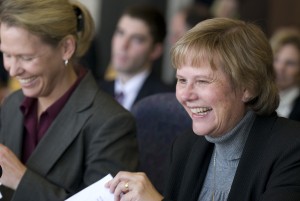UW System President Kevin P. Reilly commenced the year’s first Board of Regents meeting with a sampling of proposed initiatives aimed at strategically framing the UW System’s Growth Agenda for Wisconsin.
“The Growth Agenda remains our main focus and our top priority,” said Reilly. “It is what we all believe we need to do for the state of Wisconsin.”
After holding interactive listening sessions with participants in more than fifty local communities, surveying business leaders, and gathering public input over recent months, Reilly unveiled what he presented a slate of actions that would help achieve the Growth Agenda’s objectives of producing more college graduates, stimulating job growth and strengthening local communities.
“Through Advantage Wisconsin, we’ve identified some big issues, some big ideas, and some specific action steps,” said Reilly. He described his presentation to the Regents as “just the tip of the iceberg” in an ongoing dialogue about next steps.
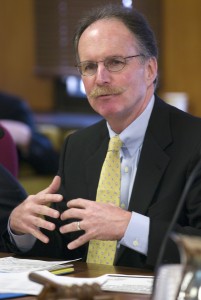
“Through Advantage Wisconsin, we’ve identified some big issues, some big ideas, and some specific action steps.” – Kevin Reilly
One initiative proposed by Reilly would create a new UW personal development transcript, or a dual transcript, that would essentially capture real-world, out-of-classroom experience such as service-learning projects.
“We all know that UW students volunteer in record numbers, engage in a wide variety of service-learning projects, and enrich their education through internships and other experiences outside the classroom,” explained Reilly.
Regent Jeffery Bartell expressed his excitement for the possibility of the dual transcript, an initiative that is the first of its kind.
“It would be great if Wisconsin was out front of other institutions,” said Bartell.
Another proposal would address what Reilly described as “swirl,” or the tendency for working-age adult students to attend numerous colleges and complete a diverse array of college courses throughout their lifetime that never culminate in a degree. Reilly explained that “swirl” is currently affecting up to a fifth of the population.
“Unless we can get more of our working adults moving on to the credentials that they need for their work and their life, we can’t get to the growth of the Growth Agenda,” said Reilly.
Under the proposal, work experience, as well as past courses and professional development experiences, would be taken into consideration for non-traditional adult students. Reilly explained that this may take the form of a “credit repository.”
Several Board members expressed support for the proposal. Regent Peggy Rosenzweig and Regent Brent Smith pointed to various initiatives that many campuses are already implementing, including those at UW-Milwaukee.
Regent Thomas Shields, who holds the non-traditional student Regent chair, saw the blend of the ten action steps as a bold step in meeting the diverse needs of both traditional and non-traditional students.
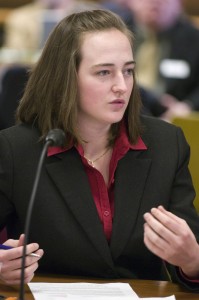
“I’m encouraged that we’re not simply calling it ‘diversity.’ That’s valuable, because it really is more about inclusion and more about community, and being excellent in a variety of ways” – Colleene Thomas
Regent Colleene Thomas supported Reilly’s suggestion that the UW System to model inclusive excellence in all of its education and employment practices, working to close the achievement gap and enroll a broader cross-section of Wisconsin’s diverse population.
“I’m very pleased to have this as one of our main objectives, and I’m encouraged that we’re not simply calling it ‘diversity.’ That’s valuable, because it really is more about inclusion and more about community, and being excellent in a variety of ways,” said Thomas.
Executive Vice President Don Mash prompted the Board to remember that hard work still lies ahead.
“[This is a] dynamic process that is going to involve a lot of work over a period of time with much work yet to unfold,” said Mash.
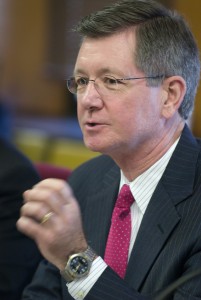
“Years after all of us are off of this board, and people talk about the turning point that occurred with the UW System in 2007 and 2008, we’ll be able to say ‘we were there.’ I think it’s that big.” –Mark Bradley
To build upon that work, the March Board meeting will focus on two major topics not addressed at today’s meeting – tuition and financial aid policy, as well as the mission of the two-year UW Colleges.
Regent President Mark Bradley described the ten action steps as a turning point for the UW System.
“When historians write about successful organizations, they identify turning points in those organizations’ histories. I’m convinced that, if we do this correctly, years after all of us are off of this board, and people talk about the turning point that occurred with the UW System in 2007 and 2008, we’ll be able to say ‘we were there.’ I think it’s that big,” said Bradley.
View news release: UW System President presents Growth Agenda Action Steps to Regents
Business, Finance, and Audit Committee: UW-Milwaukee reviews positive results of existing differential tuition
The Business, Finance, and Audit Committee conducted a regularly scheduled review of UW-Milwaukee’s tuition differentials that were initially approved in 2004 for students enrolled in the Peck School of the Arts, the College of Engineering and Applied Science, the Sheldon B. Lubar School of Business, and the College of Nursing.
“I am pleased to report that each college student committee endorses the continuation of differential tuition,” said Rita Cheng, provost and vice chancellor for academic affairs at UW-Milwaukee.
The differential tuition for each college is currently utilized for the improvement of educational technology, student services, and instructional quality.
Audrey Hale, a senior in the university’s nursing program, heralded the numerous technological advances each college has been able to implement since the differential was passed. These advances include patient simulators for the school of nursing and advanced finance labs for the school of business.
Dan Fitzpatrick, a student in the Lubar School of Business, expressed his overwhelming support for the opportunities the tuition differential has given students.
“It has added an edge to what I am able to do in the business community,” said Fitzpatrick, pointing to the fact that career advisors have since become more accessible and comprehensive.
Dan Barr and Brian Bromberek, both members of the UW-Milwaukee Student Senate, also expressed their support, but pointed to the necessity for some basic parameters if the differential were to continue.
“[Differential tuition] can be a very powerful tool for a school,” said Bromberek. His suggestions to the Regent committee included making the student committee process more democratic, creating committee bylaws, and ensuring that student voting participation remains at least a 2/3 majority, as it does now for all four schools.
Regent Brent Smith conveyed his concern that the differential has “priced out students,” a notion Cheng addressed.
“We are experiencing growth in all four schools,” said Cheng, who went on to explain that the percentage of students receiving financial aid has remained relatively steady as well.
Concerns were also raised by Regent Eileen Connolly-Keesler, who was uneasy about utilizing the tuition differentials in increasing salaries of clinical faculty in the school of nursing.
Cheng defended the salary increase, stating that the small percent increase was necessary to continue the effectiveness of the program and to maintain the number of students served.
“We are in a unique situation,” explained Cheng. “We just can’t find people because of the salaries we are offering.”
All four UW-Milwaukee colleges recommended continuing the differential tuition.
View
State Auditor Jan Mueller gives UW System a clean bill of health
Director of Financial Reporting Ginger Hintz presented the Business, Finance, and Audit Committee with the UW System annual financial report.
“It is noteworthy that our total revenues went up by 9 percent with expenses only up by 4 percent,” said Hintz.
Good news also came with a significant increase in net assets over previous years. An increase, Hintz believes, that may be related to 867 capital projects that were underway in 2007.
But there were still a number of areas Hintz pointed to that illustrate the UW System’s need to “do more with less” as both federal and state funding begin to dwindle.
The UW System’s financial report included a clean, or “unqualified,” opinion from State Auditor Jan Mueller and the Legislative Audit Bureau. The Regents invited Mueller to the committee meeting to personally present her agency’s review of university finances.
Mueller noted that the UW System’s invitation to her is a “best practice” in creating the most accurate, precise financial report.
“I hope we can make this an annual event,” said Mueller.
Financial Audit Director Carolyn Stittleburg of the Audit Bureau suggested only three areas for improvement, including securing business practices in case of a significant emergency. She did not consider the areas to be material weaknesses, but said she would follow up in 2008, working with UW System to address the matters.
“Most important are the audit results,” said Mueller. “We were able to provide an unqualified, or clean, opinion for 2007 and 2006.”
View the
Competition for executive talent focus of Business, Finance, and Audit Committee
Regent President Mark Bradley initiated a review of salary range adjustments for the UW-Madison chancellor position, the UW comprehensive campus chancellors, and the UW System president. While most other university and state salary ranges are adjusted automatically every year, these executive ranges require board action in public session. They had not been reviewed since February 2006.
Bradley emphasized that the UW System’s top academic leaders compete in national markets, as colleges and universities vie for qualified executives. In the two years since the salaries were last reviewed, compensation for chancellors and presidents at peer institutions have changed dramatically — a problem the UW System now confronts as it works to recruit three new chancellors for UW-Madison, UW-Parkside and UW-Whitewater.
“We are going into those recruiting processes with salary ranges that are two years out of date,” said Bradley, urging Regents to send a positive signal to prospective candidates for those top campus positions.
Bradley also presented a motion to adjust the salary range for the UW System president, explaining that current UW System President Kevin Reilly only received only a 0.4 percent increase in 2007 because of salary range constraints.
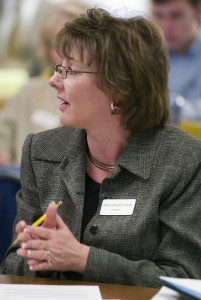
“There certainly is support from the business community. They don’t understand why our salaries are so low.” –Eileen Connolly-Keesler
Regent Eileen Connolly-Keesler conveyed that Fox Valley businesses were concerned about the relatively low salary of the UW-Madison chancellor compared to other Big 10 campuses and major U.S. research universities. “There certainly is support from the business community. They don’t understand why our salaries are so low.” said Connolly-Keeler.
If approved by the full Board, the new salary ranges will become effective on July 1, 2008.
In separate action, the Business, Finance and Audit committee reviewed recommendations by UW System President Reilly to provide market- and merit-based salary adjustments for chancellors at UW-Platteville, UW-Stout, and UW-Superior, and the provost at UW-Platteville. The committee supported Reilly’s recommended increases, which ranged from three to five percent.
In other business, the Business, Finance and Audit Committee:
- Discussed highlights of the Annual Trust Fund Report by Director Doug Hoerr;
- Discussed new reporting requirements from the legislature regarding large IT projects;
- Discussed the budget process that will be employed in preparing the 2009-11 UW biennial budget submission to the State Department of Administration;
- Discussed highlights of the quarterly gifts, grants, and contracts fro the second quarter; and
- Discussed a schedule of the UW System expenditures through the first half of the fiscal year.
Education Committee hears UW-Oshkosh campus academic plan
The Education Committee discussed the process for developing UW System campus academic plans, including draft principles for campus academic plans, deferred from the December meeting.
Senior Vice President Rebecca Martin began by reviewing the committee’s November discussion, in which members decided that UW institutions would present a campus academic plan to the committee every five years to set individual program reviews in a broader context.
Associate Vice President Ron Singer explained these plans would include information on planned academic program additions, modifications, consolidations and eliminations over a five-year time horizon. The plans are intended to provide the Regents with a more comprehensive understanding of each institution’s academic program planning and array as they align with institutional mission and identity, Singer said.
“It’s very welcome to see the Board interested in seeing the big picture,” said UW-Green Bay Provost Sue Hammersmith.
Regent Danae Davis asked if the plans are intended to have something to do with each campus’ strategic direction. Martin said that while each campus handles the process somewhat differently, the campus academic plans are strategic in responding to community needs and helping to develop faculty interests.
She added that academic planning is closely tied to the campus master plan process. “We are interested in having the Education Committee be part of these discussions because academic planning is such a big part of facility planning,” said Martin.
UW-Oshkosh Provost Lane Earnst presented a pilot campus academic plan to the committee. Earnst told the committee that the Oshkosh Plan is a dynamic document reflecting the work of the institution’s strategic planning and the results of the re-accreditation report received in spring 2007 from the Higher Learning Commission. Earnst said health care and sustainability emerged as themes now being integrated across campus programs.
In the report of the Senior Vice President, Rebecca Martin led committee members in a discussion of strategic directions for diversity as the ten-year horizon covered by the UW System’s Plan 2008 draws to a close. The committee will consider a more fully developed plan in August.
In other business, the committee approved a charter school contract between UW-Milwaukee’s Office of Charter Schools and the Bruce Guadalupe Community School. The committee also approved integrating the separate Boards of Visitors for the UW-Extension and UW Colleges into an expanded and combined Board consisting of 26 members.
View
Physical Planning and Funding Committee
At the Physical Planning and Funding Committee meeting, Associate Vice President David Miller reported that the Building Commission approved about $64 million for projects at the commission’s December and January meetings. The funding breakdown for those projects is $46 million of general fund supported borrowing and $18 million of program revenue.
Miller provided the committee with an overview of the 2009-11 Capital Budget planning process and timeline. At this time all UW institutions have submitted draft six-year plans which include requests for more than fifty major projects totaling over $1.6 billion of general fund supported borrowing, the committee learned. Under state bonding policies and practices, it is likely that the UW System could receive up to $700 million in general fund supported borrowing in the same six-year time period, Miller said. Over the next few months, UW System staff will work with the campuses and the Physical Planning and Funding Committee to prioritize the projects requested for the 2009-11 Capital Budget request, to be presented to the full board in August.
In other business, the committee:
- Gave authority to construct a continuous emission monitoring system for the Charter Street Heating Plant at UW-Madison; the system will monitor emissions of carbon dioxide, nitrogen oxides, and sulfur dioxides and is required to be installed by the end of December 2008;
- Approved the design report and gave authority to construct the Education Building’s addition and renovation at UW-Madison;
- Approved the design report and gave authority to construct the Sterling Hall renovation project at UW-Madison;
- Approved the design report and gave authority to construct the Price Commons second floor renovation project at UW-Stout;
- Gave authority to UW System to seek a statutory waiver to allow alternative forms of delivery for various construction projects at several campuses; and
- Gave authority to UW System to proceed with various maintenance and repair projects under a revised version of the resolution; these projects include elevator repairs, parking lot improvements, and storm water remediation.
The full board will consider committee action on the above items on Friday. UW-Madison deferred its request to amend the development agreement for the Wisconsin Institute of Discovery to give staff more time to evaluate the request.
View a
Photo Credit: Jim Gill
The Board of Regents will resume its February 2008 meeting on Friday, February 8, at 9 a.m.
in Van Hise Hall.
Related: Read Feb 8 (day 2) news summary

